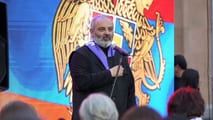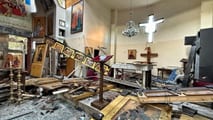Italy, allies fight court's school crucifix ban
By Tom Heneghan, Religion Editor
Reuters
PARIS (Reuters) - Italy and 10 other European states urged the continent's top human rights court on Wednesday to overturn its ban on crucifixes in schools, arguing they were signs of national identity and not overtly religious symbols.
The alliance of traditionally Roman Catholic and Orthodox Christian countries backing Italy's appeal against the ban which was handed down last November reflected their concern that the court had set a precedent for strict secularism across Europe.
A group of 33 European Parliament members also supported Rome's appeal against the ban, which shocked the country and the Vatican at a time when Italy and other European states are debating immigration and religious rights for Muslims.
The European Court of Human Rights ruled last November in favor of an Italian woman who said the crucifixes violated her right to raise her children in a secular way. It said the Italian law requiring them in all classrooms violated the state's duty to neutrality.
Most of Italy's allies are smaller nations -- Armenia, Bulgaria, Cyprus, Greece, Lithuania, Malta, Monaco, San Marino and Romania -- but they also include Russia.
Moscow's participation reflects the growing activism of the Russian Orthodox Church, which has joined the Roman Catholic Church in denouncing the widespread secularization of a continent once synonymous with the term "Christendom."
Gregor Puppinck, director of the Strasbourg-based European Center for Law and Justice that defends religious freedom cases, said the support for the appeal was unprecedented.
"Ten states are in fact explaining to the court what is the limit of its jurisdiction, what is the limit of its ability to create new 'rights' against the will of its member states," he said in a statement.
During the three-hour hearing, Italy's lawyer Nicola Lettieri said the law would violate the European Convention of Human Rights only if the requirement for symbols of the crucified Jesus in classrooms aimed to promote Christianity to pupils.
"A crucifix in the class is not there to indoctrinate anyone but as the expression of a popular feeling that is at the heart of Italian national identity," he told the Grand Chamber, the highest bench at the Strasbourg-based court.
The court will deliver its verdict in a few months.
IS "GOD SAVE THE QUEEN" RELIGIOUS?
Joseph Weiler, speaking for eight of the 10 states backing Italy, said that upholding the ban would mean several countries would have to remove crosses from their flags and God from national anthems, such as Britain's.
"I don't think that everyone who sings 'God Save The Queen' believes in God," Italy's Ansa news agency quoted him as saying. "Britain may decide someday to change or drop this phrase, but that's not a decision this court can make."
Defending the ban, lawyer Nicolo Paoletti said Italy's Constitutional Court considered the separation of church and state was so fundamental that it removed the crucifix from its courtroom in 2001.
"The secular state cannot identify itself with any religion, not even the religion of the majority of the population," he said, warning against a "tyranny of the majority." The crucifix was not "a silent and passive symbol," he argued.
In Rome, Foreign Minister Franco Frattini called the case "a great battle for freedom and for the identity of our Christian values" and said he thought the ban would be overturned.
The court acknowledged limits on its jurisdiction last week when it ruled there was no general right to same-sex marriage in Europe because 41 of the 47 countries that have adopted the European Convention on Human Rights do not allow it.
Few European states have laws requiring crucifixes but none stepped forward to support the ban.
Pope Benedict announced a new Vatican department on Thursday dedicated to "new evangelisation," or the rekindling of the faith in Europe. Leading Russian Orthodox prelates have cited this as a key area of future cooperation with the Vatican.
(Additional reporting by Thomas Calinon in Strasbourg)
© 2010 Reuters









